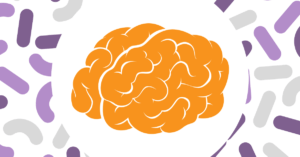
By Dr. Marvin Singh, MD
January 27, 2019
In recent years, our knowledge of the microbiome and how it influences our health—affecting anything from our mood to our digestion to our inflammation levels to our brain health—has completely exploded. And probiotics, also known as the beneficial bacteria living in our GI tract, have been a big part of it. Research has shown that probiotics have the potential to improve anxiety, help treat digestive issues like IBS, and even stimulate the immune system. And we now know that certain strains of probiotics can be good for certain issues, whether those issues be weight management, bloating, or diarrhea.
Not too long ago. however, an article came out saying that probiotics might actually cause increased brain fog in some people. Essentially, the study suggested that probiotics might actually contribute to brain fog by way of exacerbating small intestinal bacterial overgrowth (also known as SIBO).
Despite the fact that it was authored by a well-respected gastroenterologist, it was a small study with only 38 participants, and the conclusions have already been refuted by another very well-respected gastroenterologist. In other words, this article is no reason to question the many benefits of probiotics. But it is a good excuse to learn more about the link between probiotics and brain fog, especially if you’re someone who suffers from SIBO.
In simple terms, the study showed that SIBO was more prevalent in those with brain fog. After stopping the probiotics and taking a course of antibiotics, the patients’ brain fog improved significantly. So what does that tell us? In my experience, many patients that have gut symptoms such as bloating and abdominal pain try to take probiotics (without the advice of a doctor) thinking it will help all their symptoms. In many cases, it will help. But in other cases, it might not. This group of patients with SIBO actually got worse with probiotics, which is good to be aware of if you’re someone with SIBO.
So what is SIBO? Think of SIBO like this: You have 100 people (aka bacteria) at a party in a small room (aka your intestines), and the fire marshal is going to come in and shut down the party if you don’t reduce the occupancy. So you have a couple of options: Do you tell 50 more people to push through the door and force a majority of the original 100 people out? Or do you simply try to reduce the number of people already in the room? Essentially, when you take a probiotic when you have SIBO, it’s like sending 50 extra people into the room that don’t end up pushing any of the 100 original people out, and now you have 150 people in that same small room. If you had never let those 50 extra people in the room (i.e., you never took the probiotic) and you let some of the 100 people originally in the room out (i.e., you took an antibiotic or antimicrobial herbs), you’d probably find that the problem is resolved much easier.
Now, as an integrative gastroenterologist, I’m not advocating using antibiotics for SIBO outright; I’m just using this example as a point of discussion to explain where some of the confusion regarding this study may have been coming from. To tell you the truth, I see many patients who have SIBO spectrum symptoms get better with probiotics alone. I also see some patients get worse with probiotics when they have SIBO, and that’s because everyone’s gut microbiome is unique. In fact, gut microbiomes are only 10 to 20 percent similar; so what works for one person might not work for another person.
So what can you do to make sure your therapy for SIBO is working for you? First, consult a functional or integrative medicine doctor. I also do a metatranscriptomic-based gut microbiome test on my patients, which is often really beneficial. Additionally, you shouldn’t fall into the trap of thinking that there’s only one solution to your gut health problems. Just as there are many roads that can get you to a single destination, there are many roads that can help you lift that brain fog. I often offer people nutritional counseling based on their nutritional genomics and gut microbiome’s metatranscriptome, and I take into account a variety of other factors that can affect their overall and gut health.
A low-FODMAP diet can play a role in helping improve symptoms in people with IBS, bloating, and SIBO. This is a diet where you are basically removing highly fermentable sugars and sugar alcohols from your nutritional plan. Furthermore, if you have SIBO and brain fog, you don’t necessarily have to go for the atomic bomb version of therapy (antibiotics). There are other alternatives you could consider. A very well-done study by my colleagues at Johns Hopkins University demonstrated that two particular herbal regimens were just as effective as Xifaxan in the treatment of SIBO. I often use the herbal regimens quite successfully in my practice. However, the choice between what therapies and approaches to use should be carefully thought out and discussed in conjunction with your physician because there are certain considerations that are important to discuss even for herbal therapies.
So, there you have it. That’s the skinny on SIBO and brain fog. The important lesson from this recent controversial article is to make sure you actually read the study and understand what was done and what that actually means. If there is a rebuttal like there was in this case, it’s also a good idea to read that because it will give you a better picture of the whole story. Finally, remember that we are all unique individuals; this is what makes solving health problems complicated, but it’s also what makes us all special. What works for someone else may or may not work for you, so make sure to find a health care practitioner who can listen to your story and help you get on the road to defeating SIBO and brain fog that is best for you.


